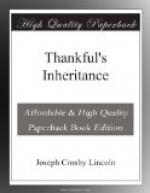Emily interrupted.
“But, Auntie,” she said, “a mortgage is a debt, isn’t it? A debt that must be paid. And if you borrow from a stranger—”
“Just a minute, Emily. Course a mortgage is a debt, but it’s a debt on the house and land and, if worse comes to worst, the house and land can go to pay for it. And I don’t mean to borrow from a stranger, if I can help it. I’ve got a relation down here on the Cape, although he’s a pretty fur-off, round-the-corner relation, third cousin, or somethin’ like that. His name’s Solomon Cobb and he lives over to Trumet, about nine mile from here, so Cap’n Bangs says. And he and Uncle Abner used to sail together for years. He was mate aboard the schooner when Uncle Abner died on a v’yage from Charleston home. This Cobb man is a tight-fisted old bachelor, they say, but his milk of human kindness may not be all skimmed. And, anyhow, he does take mortgages; that’s the heft of his business—I got that from the cap’n without tellin’ him what I wanted to know for.”
Miss Howes smiled.
“You and Captain Bangs have been putting your heads together, I see,” she said.
“Um—hm. And his head ain’t all mush and seeds like a pumpkin, if I’m any judge. The cap’n tells me that east Wellmouth needs a good summer boardin’-house. This—this contraption we’re in now is the nighest thing there is to it, and that’s as far off as dirt is from soap; you can see that yourself. ‘Cordin’ to Cap’n Bangs, lots and lots of city people would come here summers if there was a respectable, decent place to go to. Now, Emily, why can’t I give ’em such a place? Seems to me I can. Anyhow, if I can mortgage the place to Cousin Sol Cobb I think—yes, I’m pretty sure I shall try. Now what do you think? Is your Aunt Thankful Barnes losin’ her sense—always providin’ she’s ever had any to lose—or is she gettin’ to be a real business woman at last?”
Emily’s reply was at first rather doubtful. She raised one objection after the other, but Mrs. Barnes was always ready with an answer. It was plain that she had looked at her plan from every angle. And, at last, Miss Howes, too, became almost enthusiastic.
“I do believe,” she said, “it may turn out to be a splendid thing for you, Auntie. At least, I’m sure you will succeed if anyone can. Oh dear!” wistfully. “I only wish it were possible for me to stay here and help with it all. But I can’t—I can’t. Mother and the children need the money and I must go back to my school.”
Thankful nodded. “Yes,” she admitted, “I suppose likely you must, for the present. But—but if it should be a go and I should see plainer sailin’ ahead, then I’d need somebody to help manage, somebody younger and more up-to-date than I am. And I know mighty well who I shall send for.”
They talked for a long time, but at last, after they were in bed and the lamp was extinguished, Emily said:




